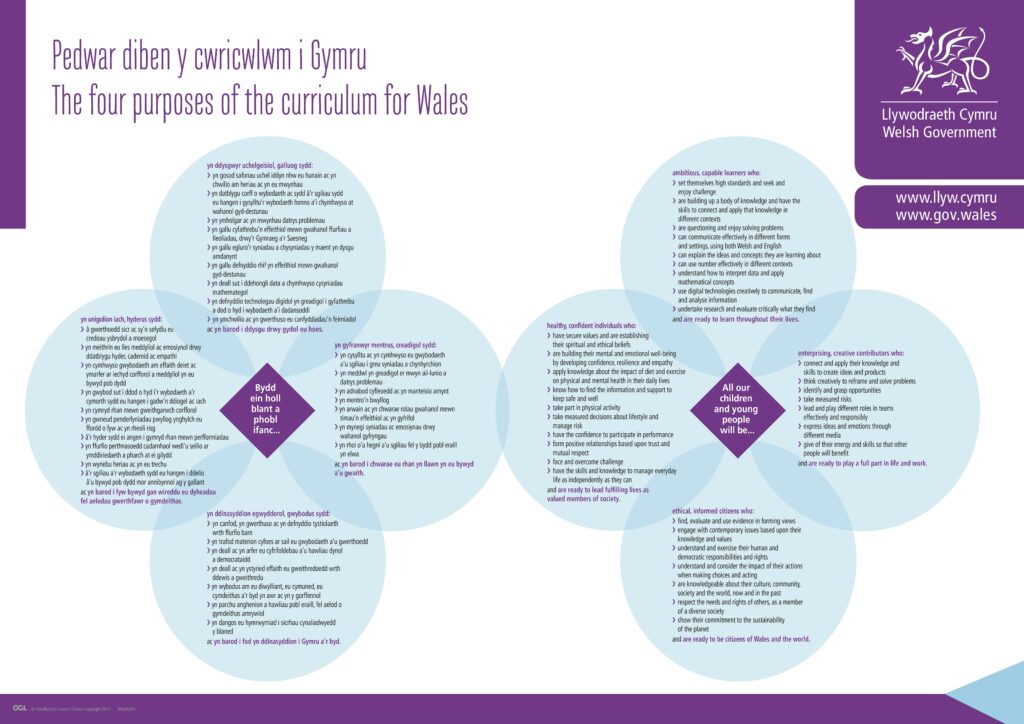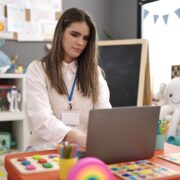Find information, resources and links to training opportunities relating to Early Childhood, Play Learning and Care (ECPLC), Curriculum for Wales and Foundation Learning pedagogy from NDNA Cymru.

Early Childhood Play, Learning and Care (ECPLC) in Wales
The early years play a significant role in childhood as well as in shaping our futures. Early Childhood Play, Learning, and Care (ECPLC) is an integrated approach to education and childcare for children aged 0-5, focusing on holistic development to support well-being and lifelong learning, aligning with the Curriculum for Wales and National Minimum Standards.
Curriculum for Wales
Curriculum for Wales is a continuum of learning for children from 3 to 16 years of age. There are no ‘phases’ or ‘stages’, with all children learning along the same continuum.
As it can sometimes be important to define the integral early years of a children’s learning, you may see the term ‘Foundation Learning’ being used to help differentiate the earlier years of the learning continuum when discussing practice, pedagogy and resources. Foundation Learning should not be used to describe the curriculum that children are learning through.
Central to the curriculum are the four purposes. These four purposes are the same for all children and underpin all teaching and learning in Wales. The curriculum aims to develop children who are;
- Ambitious, capable learners, ready to learn throughout their lives
- Enterprising, creative contributors, ready to play a full part in life and work
- Ethical, informed citizens of Wales and the world
- Healthy, confident individuals, ready to lead fulfilling lives as valued members of society.
Don’t be scared of the change! Learning through play and child-led learning remains, and the principles and pedagogy derive from the Foundation Phase, something that the early years sector in Wales have been doing for years.
Find information, resources and links to training opportunities relating to Early Childhood, Play Learning and Care (ECPLC), Curriculum for Wales and Foundation Learning pedagogy from NDNA Cymru below
More support
ECPLC / Curriculum for Wales guidance documents
Anti-racist practice
Resources and factsheets
Training and events
1:1 support for members
Reflective Practice and Self-Evaluation
FAQs
With regards to planning, will there be templates like we had with the Foundation Phase?
In short- no. A defining feature of the guidance, is that it is not an ‘off the shelf’ programme for delivery. The documents have been designed for practitioners to support them in developing appropriate effective environments and engaging experiences that respond to children’s interests and engages them further in their development and progress.
Enabling adults are encouraged to get to know their children and plan in a way that suits their children and staff best, trialling and reviewing different approaches within the setting.
What are the expectations with regards to assessment? What does it look like?
Under the Curriculum and Assessment Act (Wales) 2021, all providers of funded non-maintained nursery education have a legal duty to make and implement assessment arrangements to support children’s progression within their adopted curriculum.
However, under Standard 3 “Assessment” of the National Minimum Standards for regulated childcare registered persons from all registered childcare settings have a responsibility for ensuring that: “All children have their needs and preferences identified and their parents know how these will be met.”
It is important to note that this guidance moves away from the previous outcome driven forms of assessment and ‘tick list’ assessment.
Are Estyn/CIW aware of these documents?
Welsh Government has remained in contact with the inspectorates regarding guidance development. The inspectorates and Welsh Government have held a number of training and awareness session for inspectors, and inspectors also have access to the training modules which are available on Hwb Resources, to support their understanding.
If you would like further support prior to or post inspection, please contact NDNA Cymru’s Early Years Education Officer.
My setting does not receive funded nursery education hours, are these documents for us?
Settings that do not receive funding to provide education are still encouraged under the National Minimum Standards to deliver practice in line with the statutory curriculum requirements:
“7.1 The principles of the curriculum are understood and applied in a way appropriate to the age, abilities, and stage of development of children in their care and the nature of the provision. Non-funded settings are encouraged to incorporate this curriculum into their work.”
The guidance is age, ability and stage appropriate for the learners within your setting. Therefore, all settings are encouraged to adopt and implement this guidance.
Is the curriculum designed to be delivered to children from 0 upwards?
The curriculum for funded non-maintained nursery settings has been developed to support work with children at the very beginning of the 3-16 learning continuum as well as those with additional learning needs. Predominantly this curriculum supports the learning and development of children aged 3-4 years to ensure they have the best possible start on that journey.
The Welsh Government have published additional guidance which sets out a framework for ensuring quality provision for all children from birth to age 3: Early childhood play, learning and care: Developmental pathways 0 to 3
This guidance focuses on what is important for children’s development and how we can best support them to grow and develop in ways that suit their stage of development. As with the Curriculum for funded non-maintained nursery settings and the Assessment arrangements for funded non-maintained nursery settings, The Early childhood play, learning and care: Developmental pathways 0 to 3 has been co-constructed with practitioners and specialists across the education and childcare sectors.
If you need more support please contact the NDNA Cymru team:
NDNA Cymru members can also contact NDNA’s Early Years Education Officer, Hayley Grayson for specific queries or support through;
- Phone – 01824 707823 Ext 273
- Email – [email protected]








